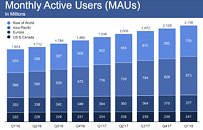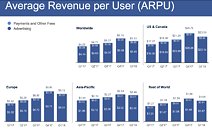Friday, May 4th 2018
Cambridge Analytica Files for Bankruptcy, or The Permanency of the Status-Quo
So, here's the thing: everyone that has some sort of window to the world around them has been made aware of the Facebook data scandal that's connected to Cambridge Analytica. Rivers of ink have already poured from journalists' metaphorical fountain pens. However, let's be honest: what real impact has this had on peoples' minds and overall level of comfort with debatable practices and data maintenance or access? What real impact is this having in the grand scheme of things, period?
Facebook exited its 1Q 2018 with record-setting numbers, for one. It just goes to show the entrenched fortress that Facebook has become, the efficiency of its advertising machine, the gargantuan state of dependency and the strength of network effects, of traction, as she put it - everyone (well, not this editor) has one, and thus no-one wants to be left out. Even things as simple as how easy it is to login and register for different services by connecting a Facebook account leads people to stay - and thus the status quo is maintained. The $11.97 billion in revenue with $1.69 EPS that Facebook achieved in its Q1 report, alongside the increase in 48M daily active users should give everyone pause. Is this becoming a case of being too big to fail? What would be required for such a scenario to manifest itself? What sort of betrayal of customers' trust?However bad will has been levied at Facebook, the reduced stock price and lower earnings per user have been faced as - and effectively are - no more than small bumps on the road. Mr. Zuckerberg has even announced some steps that a cynical person might see as smoke and mirrors to carry users' attention away from the current issues: the new Facebook dating features. These, which could bring Facebook the added weight of a Tinder-like feature, will be a true test for user confidence on the system... Or so it's being hailed. I, for one, have no doubts that it's a long planned feature, that has just found the perfect timing to be announced and eventually implemented, sucking in users even more than it already has. The consequences? To be diluted in new features and a perceived dependency of Facebook's network effects - not unlike what was seen in Mr. Zuckerberg's hearing. He did bring a suit, though.Which brings me to the firestarter of this small editorial: the situation with Cambridge Analytica. The company has recently filed for bankruptcy, but really, we all know how this works even before it's spelled out: a company like that, which was so successful until the lid was blown, just doesn't go under the water of its own will. No - it morphs; its management moves on to greener, newer pastures, moving along their connections, resources, market and client knowledge, and set up shop somewhere else, looking to continue their ways. It's true: Cambridge Analytica is dead. One face of it, at least. The other has emerged as Emerdata, a new company that has been set up in the last few months by Cambridge Analytica's top executives. When your name is tainted and lawsuits loom, you can always just declare yourself dead and get a new identity. Saves so much trouble, doesn't it?According to The New York times, Emerdata has been populated by Cambridge Analytica's (and parent company SCL) biggest investors, and brought in "talent" from their skeletons. According to the NYT's sources, re-branding Cambridge Analytica was the plan, with Nigel Oakes, an executive and partner of SCL Group, having publicly described Emerdata as "a way of rolling up SCL Group and Cambridge Analytica into one company". Alexander Nix, a former CEO of Cambridge Analytica (who was caught on tape talking about bribing and blackmailing politicians, and who resigned a few weeks ago alongside other SCL Group executives), has also joined Emerdata. So much for shaking the status-quo. So, long live Cambridge Analytica?The European Union's GDPR (General Data Protection Regulation) that enters into effect as early as May 28th is a definite step in the right direction towards enforcing responsible business practices and data collection - and storage - from companies. If they fail to abide to the transaparency that's required by the Regulation - or fail to admit the "right to be fogotten" or furnishing consumers their own data - companies can be fined up to 4% of annual global revenue (or up to €20 million, whichever limit is hit first).
And as much as it will likely become a spearhead for similar regulations across the world - old Facebook themselves have pledged to extend GDPR's requirements and directives globally, though "not exactly" - the fact remains that user choice is the ultimate protest. Drying the income well by making a conscious effort to stay informed and think through the data disclosure consent forms that pop up every so often in a new app update or some such is the best way to remain critical and alert, and now allowing oneself to become mere numbers in a datasheet.But maybe that ship has sailed. Maybe the solution is trying and creating a stronger network effect of choosing not to partake in shady business practices and data collection scandals - that would likely be the best way to make companies change. People are more than consumers, and consumers should be more than numbers.
Sources:
TechCrunch, CNN, New York Times, The Verge, The Guardian, EU GDPR
Facebook exited its 1Q 2018 with record-setting numbers, for one. It just goes to show the entrenched fortress that Facebook has become, the efficiency of its advertising machine, the gargantuan state of dependency and the strength of network effects, of traction, as she put it - everyone (well, not this editor) has one, and thus no-one wants to be left out. Even things as simple as how easy it is to login and register for different services by connecting a Facebook account leads people to stay - and thus the status quo is maintained. The $11.97 billion in revenue with $1.69 EPS that Facebook achieved in its Q1 report, alongside the increase in 48M daily active users should give everyone pause. Is this becoming a case of being too big to fail? What would be required for such a scenario to manifest itself? What sort of betrayal of customers' trust?However bad will has been levied at Facebook, the reduced stock price and lower earnings per user have been faced as - and effectively are - no more than small bumps on the road. Mr. Zuckerberg has even announced some steps that a cynical person might see as smoke and mirrors to carry users' attention away from the current issues: the new Facebook dating features. These, which could bring Facebook the added weight of a Tinder-like feature, will be a true test for user confidence on the system... Or so it's being hailed. I, for one, have no doubts that it's a long planned feature, that has just found the perfect timing to be announced and eventually implemented, sucking in users even more than it already has. The consequences? To be diluted in new features and a perceived dependency of Facebook's network effects - not unlike what was seen in Mr. Zuckerberg's hearing. He did bring a suit, though.Which brings me to the firestarter of this small editorial: the situation with Cambridge Analytica. The company has recently filed for bankruptcy, but really, we all know how this works even before it's spelled out: a company like that, which was so successful until the lid was blown, just doesn't go under the water of its own will. No - it morphs; its management moves on to greener, newer pastures, moving along their connections, resources, market and client knowledge, and set up shop somewhere else, looking to continue their ways. It's true: Cambridge Analytica is dead. One face of it, at least. The other has emerged as Emerdata, a new company that has been set up in the last few months by Cambridge Analytica's top executives. When your name is tainted and lawsuits loom, you can always just declare yourself dead and get a new identity. Saves so much trouble, doesn't it?According to The New York times, Emerdata has been populated by Cambridge Analytica's (and parent company SCL) biggest investors, and brought in "talent" from their skeletons. According to the NYT's sources, re-branding Cambridge Analytica was the plan, with Nigel Oakes, an executive and partner of SCL Group, having publicly described Emerdata as "a way of rolling up SCL Group and Cambridge Analytica into one company". Alexander Nix, a former CEO of Cambridge Analytica (who was caught on tape talking about bribing and blackmailing politicians, and who resigned a few weeks ago alongside other SCL Group executives), has also joined Emerdata. So much for shaking the status-quo. So, long live Cambridge Analytica?The European Union's GDPR (General Data Protection Regulation) that enters into effect as early as May 28th is a definite step in the right direction towards enforcing responsible business practices and data collection - and storage - from companies. If they fail to abide to the transaparency that's required by the Regulation - or fail to admit the "right to be fogotten" or furnishing consumers their own data - companies can be fined up to 4% of annual global revenue (or up to €20 million, whichever limit is hit first).
And as much as it will likely become a spearhead for similar regulations across the world - old Facebook themselves have pledged to extend GDPR's requirements and directives globally, though "not exactly" - the fact remains that user choice is the ultimate protest. Drying the income well by making a conscious effort to stay informed and think through the data disclosure consent forms that pop up every so often in a new app update or some such is the best way to remain critical and alert, and now allowing oneself to become mere numbers in a datasheet.But maybe that ship has sailed. Maybe the solution is trying and creating a stronger network effect of choosing not to partake in shady business practices and data collection scandals - that would likely be the best way to make companies change. People are more than consumers, and consumers should be more than numbers.











23 Comments on Cambridge Analytica Files for Bankruptcy, or The Permanency of the Status-Quo
I take issue with a lot of it but it was presented quite nicely.
The extension of this is that GDPR effectively allows Facebook to keep your data once you tap "yes, I agree" on the new "user-fiendly terms and conditions", it will just not share it in an undisclosed manner.
The dating part is hilarious, Tinder nullified the fear some people had to make the 1st contact, besides all else. Facebook's approach seems to me that will just fine-thread relationship attempts between users and non-users.
Think what you want, hate/love Facebook and scream/don't care about privacy concerns, but I would not want to be in his position.
I don't know how you limit advertising without censoring free will...but I think we can agree manipulation is off limits...then someone argues it's not manipulation its expression and bleh
Try not pissing off the politicians, things will be
ignoredslide much smoother.:rolleyes:Small businesses actually don't have as much of a problem as big ones, because smaller business can exercise control more readily, their process has less actors to deal with, etc.
The beauty of GDPR is that even though it is an EU legislation, the strictness of it and the penalties on breaking it are rather well defined and if a company readies the process and infrastructure as GDPR-compliant then why not just do it for the rest of the world as well. The risk of accidentally missing something is high and you've already explored 'how to do it' and even implemented it, so its easy to apply it elsewhere. This is the power of the internet, now used by the opposing side (you say politics, I say important legislation that was LONG overdue and the recent outrage surrounding data was the push it needed) and I really like what I'm seeing.
Its stuff like this that makes me happy to be an EU citizen, it showcases why we need to be in it, and how it can change the world for the better. It won't always be perfect but its a big step in the right direction.
It's not wise to close yourself off from data analytics like that. It's apparently only a massive problem to gain that kind of insight when the "other side" in politics is profiting and you're offended... Liberal outrage at its finest.
CA was started in 2013. maybe you should check facts before posting speculation and this thread degrades into political BS.
Maybe read this article and educate yourself: www.investors.com/politics/editorials/facebook-data-scandal-trump-election-obama-2012/
just proves my point that anyone will make up facts to push "little white lies" in their opinion as the truth.
Do you understand how you are being lied to and manipulated to think this is bad right now, when in all honesty it is just someone using data to create a report and gain some insight? 99% of campaigns use data like this from other firms like CA. In what world do you suddenly live in???